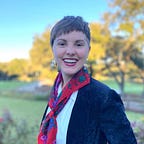Anthropology trains students to become aware of and express their biases as an essential part of the scientific method because, after all, the anthropologist’s primary instrument for collecting ethnographic data is themself. By identifying and articulating their own story, the ethnographer makes the implicit more visible so they are better able to recognize when their biases are skewing their observations of a situation and analysis of the data. The goal here is not to rid yourself of biases — we know that is difficult, if not impossible, to do — but rather to be aware of them and work with that awareness as best you can to let the data speak for itself without your beliefs getting in the way. Pick up an ethnographic text and you’ll find in the first few pages a statement of the author’s positionality and how they believe it affected or may have affected their research. This statement serves as a disclaimer to the reader to take into account how the author’s lived experiences may have shaped the study.
Lately, I have been feeling inspired to write and share my stories with others as a way to engage in conversation with folx who are simmering on related ideas and learn from them. Since I have chosen to be mostly inactive on social media for my physical and mental health, I’ve felt out of touch from important and exploratory conversations that I know are happening online with a global community. So I’m going to try writing on Medium to bridge that gap.
Before I embark further on this journey, I first want to share my statement of positionality, including acknowledging my privilege and sharing some principles that currently shape my thinking, which influence what I choose to focus on in my writing. Thank you to my friend Glafira “Glasha” Marcon for inspiring me to reflect on how I would want to share my positionality as a writer.
My privilege and principles generate assumptions that are embedded in my writing. I recognize that by writing I am centering my perspective and amplifying my voice. And I aim to read, share, and build on the ideas and writings of people who offer perspectives that I cannot, especially people of color and Indigenous peoples. My primary goal is to enter into conversation from a place of love, including kind, compassionate, and critical debate; I invite your feedback and dialogue.
I am a white. I am currently living on the land of the Coast Salish peoples, specifically the Duwamish Tribe. By being here in Seattle, I am contributing to and benefitting from settler colonialism. I actively mitigate my impact by learning about historic and ongoing injustices and experiences of Duwamish and other Indigenous people here (and elsewhere); using my power in my job and elsewhere to support, elect, and defer to Indigenous leaders and community members as knowledge bearers; paying Real Rent to the Duwamish; and through a lot of other minor, moment-to-moment ways. I’m taking similar steps in everyday life to dismantle white supremacy, which looks like a lot of micro-adjustments and -disruptions. I admit on both of these fronts, there is a lot more I can do. It’s ongoing. It’s iterative. It’s a lot of screwing up, listening, learning, and trying again.
I am queer and genderqueer AFAB (assigned female at birth) person, though most of my life I identified as straight and cis-gendered and benefited from that privilege. I grew up in a middle class household and now I’m in a lower-middle class income bracket. I am employed, only have to work one job for a comfortable income, and have family who can (and have) financially support me in challenging times. I have a secondary degree. I am able-bodied, and while I’m recovering from past physical and emotional traumas, these challenges don’t significantly inhibit me in my current daily life.
Below are some principles/beliefs I’m working with at this time. They are ever-evolving. They are drawn from the influences and teachings of many individuals and philosophies, including: Amartya Sen, Mary Oliver, Audre Lorde, Rainer Maria Rilke, yogic philosophy, Zen Buddhism, Tali Hairston, amb, Cleo Wade, Nayyirah Waheed, Native Hawaiian teachings, Matika Wilbur, Adrienne Keene, Krista Tippett, Aldo Leopold, and so many others.
- Connection with all things — human and non-human, living and not living — is the invisible thread that allows us (all things) to exist.
- There is no such thing as not enough. Time, resources, success, ourselves — everything is abundant.
- At our core, we are inherently whole. We can never be broken or damaged.
- Except for our inner and interconnected core, change is constant.
- Everything we do every day creates the future that will become. The micro creates the macro. (thank you adrienne maree brown for articulating this so well through fractals)
- Love is far more powerful than fear.
- Nothing is a monolith. There are multitudes within us all.
- Our collective path toward a livable future on this planet requires decolonizing our lands, dismantling white supremacy and patriarchy, and reindigenizing our relationships to each other and our earth.
- Effectively mitigating the worst climate change impacts and adapting to a changing world requires that we heal past traumas and create transformative and just change to new systems and ways of being that are built with the leadership of Indigenous communities and people of color on the frontlines of climate impacts.
Please be in touch with kindness and compassion.
